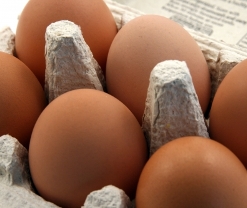UK egg consumers paying more whilst producers get less

Whilst consumers are facing bulging food bills, Britain’s free range egg farmers are facing economic ruin because their payments are being cut, reports the British Free Range Egg Producers Association.
Latest figures from the British Retail Consortium show that food inflation was up to 4.9% in May compared with 4.7% the previous month. Yet the leader of Britain’s free range egg producers says that egg farmers are making huge losses because payments from supermarkets and packers have been cut. The cuts in payments have come at the same time that farmers’ feed costs have increased substantially – largely because of the soaring price of wheat on international markets.
Egg prices
“Free range egg producers are facing a desperate situation,” said John Retson, chairman of the British Free Range Egg Producers Association (BFREPA). “We see reports in newspapers and on the television that the price of eggs in the supermarkets has been going up along with the price of other foods, but egg producers have seen the price they receive cut by five pence per dozen. At the same time, since the turn of the year costs have increased by the equivalent of 15 pence per dozen because of world commodity prices increasing the cost of feed. Egg producers face being forced out of business.”
BFREPA’s business costings indicate that producers are currently losing more than £6 on every hen, whilst the association’s own surveys show that the prices charged for eggs on supermarket shelves have increased. A dozen medium free range eggs cost £2.72 at supermarket chain, Asda in May last year. In May this year they were selling for £2.87. At rival Tesco, the price of a dozen medium free range eggs has similarly increased from £2.72 to £2.87 over the same period of time. Whilst consumers have being paying more for their eggs, producers have been receiving less and the farmers’ costs have risen dramatically.
Losses for egg producers
“It is very frustrating when you see reports in newspapers and on television news saying that consumers are having to pay more. Those consumers should know that the extra they are paying is not reaching the egg producers because we are making very big losses. Something has to change or we will see a great many people going bust,” said John Retson, who has appealed to supermarkets to help ease the plight of farmers if they want to ensure that supplies of quality UK eggs will be available to them in years to come.
“I am very worried about the effect that these losses will have on the supply chain. Some producers will go out of business if this continues; others will be forced to find an alternative way of making a living. It is simply not sustainable for producers to continue making losses of £6 per bird. Supermarkets and packers need to ensure that they will continue to have a safe and secure supply of quality UK eggs.”
Too many eggs
Free range egg producers are being told that there are simply too many eggs on the market at the moment, and the packers’ organisation, NEMAL, has warned that this position could continue into next year. However, chick placements have been falling – something that will eventually reduce the size of the national layer flock, and impending European Union legislation will ban the use of conventional layer cages from January 1 2012. How many eggs will be removed from the market when conventional cages are banned is unclear at the moment, but some people fear that we may be left with a shortage of eggs in the UK if too many free range producers are forced out of the industry because of their current losses.
Source: British Free Range Egg Producers Association













